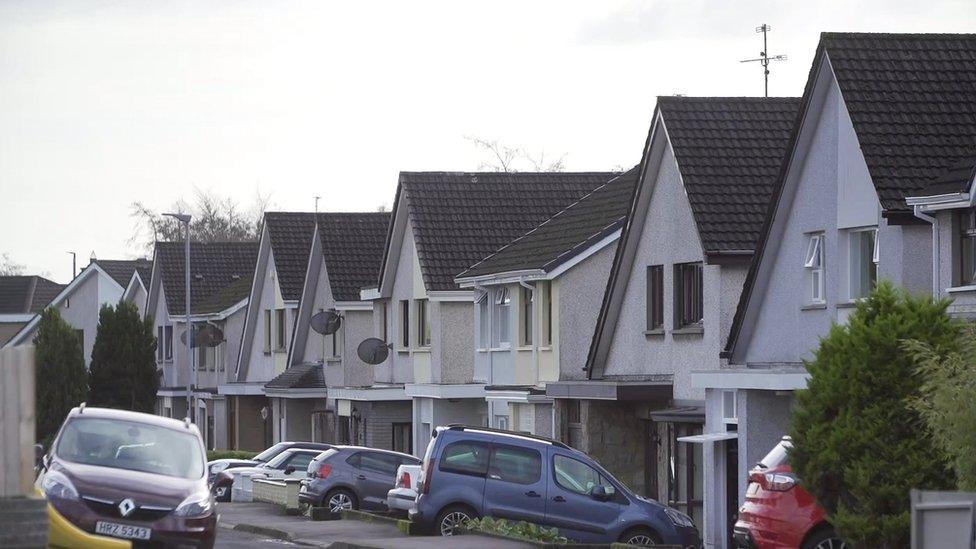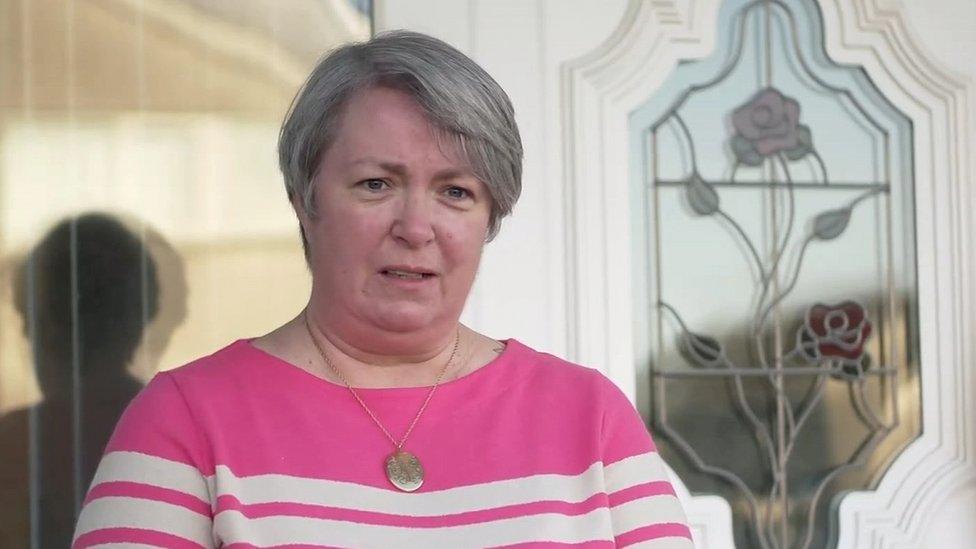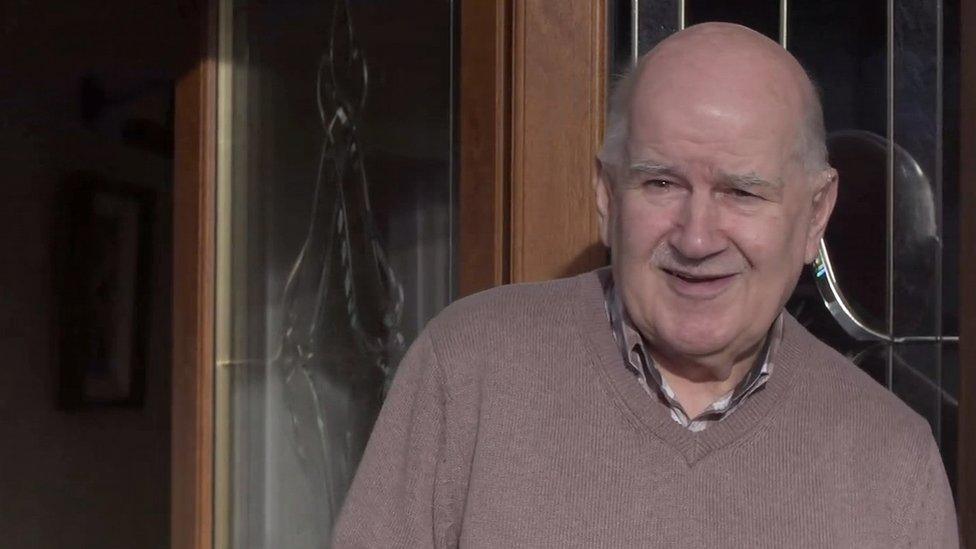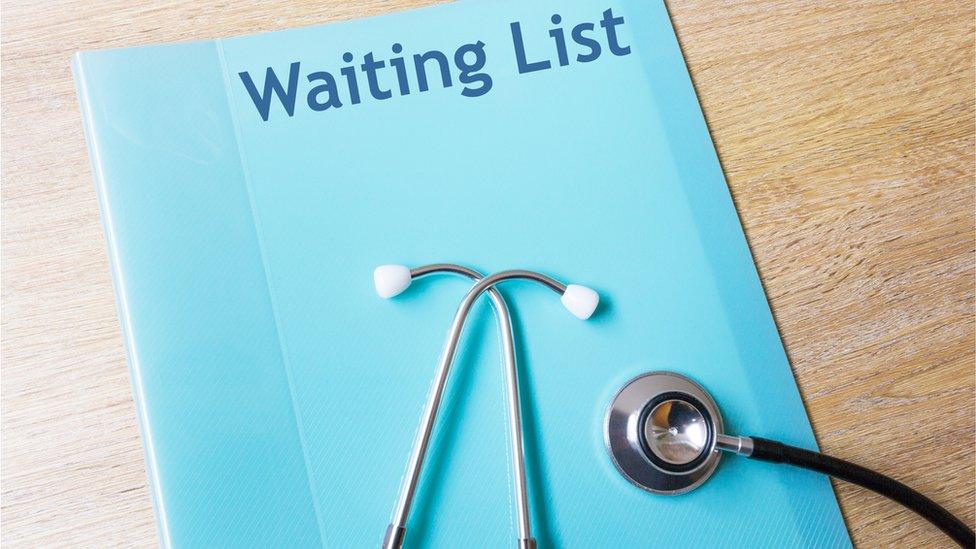Hospital waiting lists: Cullybackey is a village 'in pain'
- Published
'I've been waiting in pain for two years'
Tucked away in the heart of County Antrim lies Cullybackey.
It's a neat little place known locally as The Railway Village, where generations of families live side by side.
It's also Robin Swann territory and with hospital waiting lists hurtling down the track to a new record high, BBC News NI visited the village to speak to some of those who are living on a list.
One resident has said she has learned to "live with the pain".
The Northern Health and Social Care Trust has "apologised unreservedly" to those impacted by cancellations.
There are 327,189 people waiting for a first appointment with a consultant - 21,014 more than in 2019, according to the latest figures from the Department of Health.
Almost 280,000 people were waiting more than nine weeks for a consultant outpatient appointment compared to just over 276,000 in June 2019 and 232,239 last September.
Almost half of patients are waiting more than a year for a first-consultant appointment.
The ministerial target for inpatient and day case waiting times states that by March 2021, 55% of patients should wait no longer than 13 weeks for inpatient or day case treatment - with no-one waiting more than a year.
'This is ridiculous'
On just one Culleybackey street, Fendale Park, BBC News NI spoke to five people waiting for a range of procedures including cataracts, hip and cancer-related operations.

Five Ferndale Park residents spoke to the BBC about being on waiting lists
Karen Monaghan, 46, said she has had a gallbladder operation cancelled five times, having initially been admitted to Antrim Hospital A&E
She told BBC News NI: "I was admitted into Antrim A&E in November 2018 with an emergency gallbladder procedure required.
"I was told it would be done within 10 weeks. About 105 weeks later, five operations cancelled, I am still waiting.
"This is ridiculous that anybody has to wait this length of time for something that is an emergency.
"They can't blame the pandemic for my operations being cancelled - three were cancelled and we weren't even in the pandemic."

"You learn to live with the pain," says Karen Monaghan
Ms Monaghan, an accountant, said she lives in constant pain, has suffered liver damage and has been prescribed anti-depressant medication.
While she sympathises with frontline health workers, she believes the system has to change.
"You learn to live with the pain," she added.
"The gallbladder and the stones are very painful but when you are actually physically sick that really does rip you apart.
"I fully support the NHS and everything they are trying to do but they need more money, more nurses and they need more beds."


New approach sidelined?
Northern Ireland's hospital waiting times are a millstone around the health service's neck, being described by the Nuffield Trust last year as a "national scandal".
At that stage, the Royal College of Surgeons said the health system was at a "point of collapse", so the pandemic cannot be entirely blamed for the dire situation.
In the past five year, numerous health experts have called for leadership, accountability and brave decisions to be taken.
In January, Health Minister Robin Swann pledged to start a process to make the health service fit for purpose.
January's deal to restore power-sharing at Stormont - New Decade, New Approach - offered a degree of optimism and Mr Swann some much needed political support.
But the pandemic means work to reduce waiting times has once more been sidelined.

The Northern Health and Social Care Trust said "demand for surgical procedures has continued to grow beyond the capacity available".
In a statement, the trust added: "Notwithstanding the additional pressure that Covid presents, the demand for general surgery outstrips the resources available to see and treat all patients in a timely manner.
"Patients with confirmed or suspected cancer and clinically urgent patients are being prioritised. Anyone who has been cancelled will be rebooked as soon as it is possible to do so."
Mr Swann said he regretted the amount of people waiting on procedures but warned that "unfortunately this position can be expected to worsen further".
"Waiting lists were a clear priority in New Decade New Approach [the deal to restore devolution at Stormont] but plans were blown off course by the pandemic," he said.
"I am very conscious that public spending is likely to be very constrained next year and that all departments will be facing serious funding pressures.
"The reality is that tackling waiting lists will not be possible without sustained and substantial investment and additional staffing."
Living nearby, pensioner David Davis, 75, is stoic about his lengthy wait for a new knee replacement.

David Davis, 75, is stoic about his lengthy wait for a new knee replacement
"This is my third year going into my fourth year and there's not much sign of it happening at the minute," he said.
"I feel sorry for the health service that things are the way they are.
"I am only one of many, I am sure there's many a person who are worse off than me."
Several streets away 87-year-old Betty Loughlin said she too is on an orthopaedic list.
Her love for baking and dancing have been put on hold for almost two years as she waits for a new knee.
"The pain is out of this world," she said.
"I can't get into cars, I can't get out of cars. I have bother getting out of bed."
"When you get out of bed you have to wait a minute or two until the knee strengthens up and then I have a walking stick upstairs and I lean on it to get to the wardrobe and then I hold on to the wardrobe until I get out to the handle.
"I could be walking along - when I go up a height it's lethal.
"I could come down and I don't want to fall at my age because you break a bone now and that's the finish of you."
- Published27 August 2020

- Published27 February 2020
